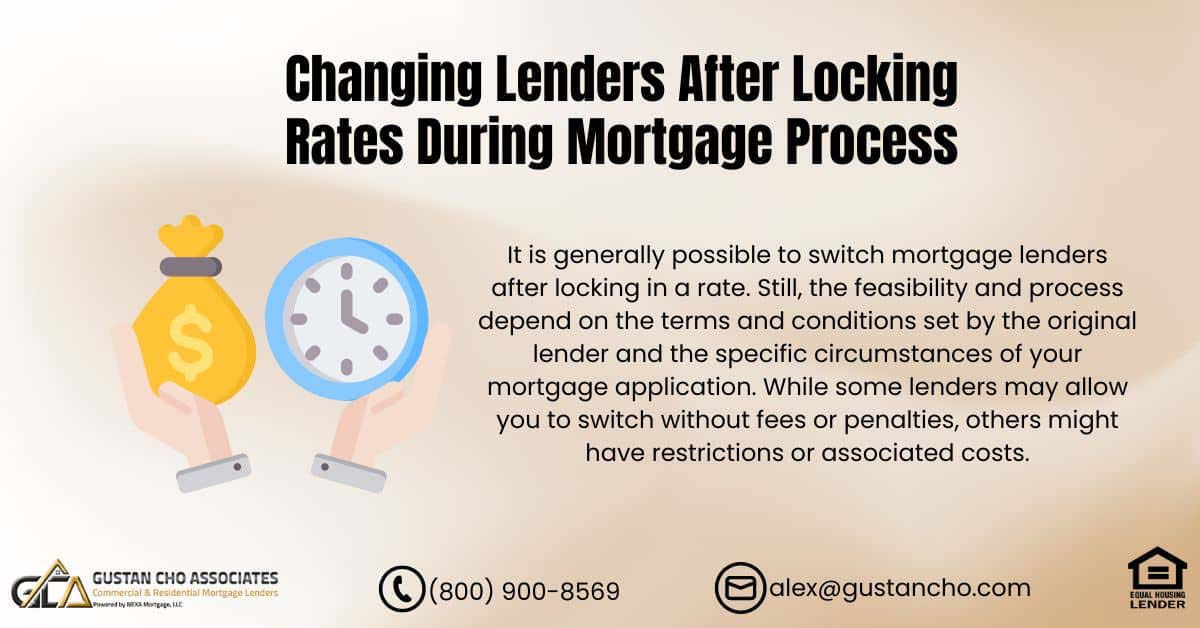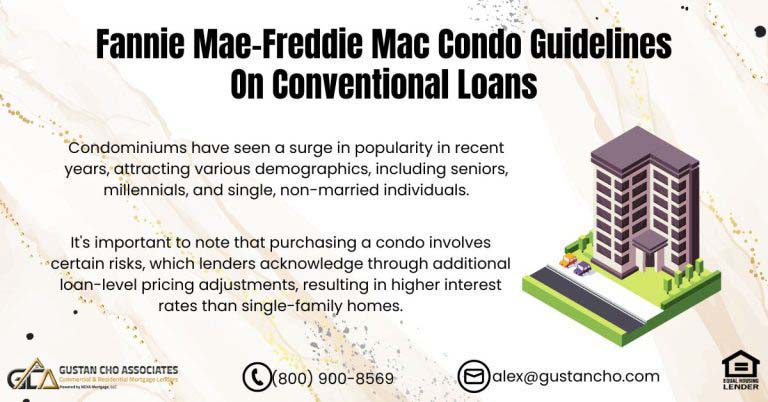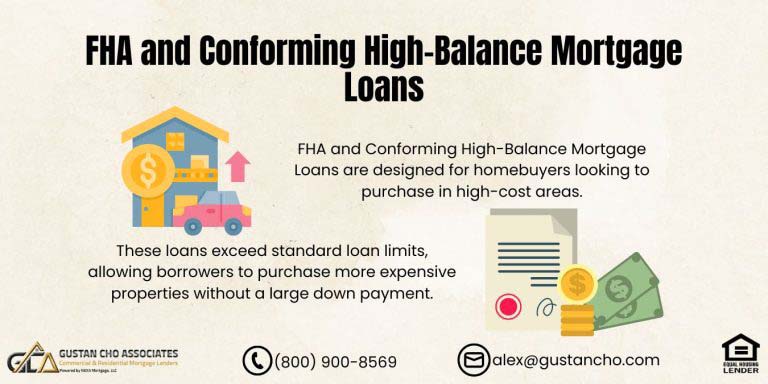Changing Lenders After Locking Rates: What You Need to Know in 2024
Locking in a mortgage rate is a critical step for any homebuyer. Once your rate is locked, you’re often left wondering if you’ve made the right choice. But what happens if you find a better rate or your experience with your lender isn’t going as smoothly as planned? Can you switch lenders after locking rates? The short answer is yes, but there are important things you need to know before making the change. In this guide, we’ll walk you through everything you need to consider when changing lenders after locking rates in 2024.
Why Change Lenders After Locking Rates?
Homebuyers often start the mortgage process with the first lender they find, especially when it feels like they’re getting a good deal. However, as the process moves forward, issues can arise that make switching lenders look like a better option. Some common reasons borrowers think about changing lenders after locking rates include:
- Better Rates Found Elsewhere: If you locked in a rate but later discover another lender offering significantly lower rates, it’s natural to reconsider your decision.
- Unresponsive Loan Officers: If your lender takes a long time to reply to your phone calls, text messages, or emails, it can cause avoidable anxiety. Timely communication is essential when buying a home, and poor service is a common reason for switching lenders.
- Unexpected Loan Denials: Sometimes, borrowers get last-minute mortgage denials because their loan officer didn’t properly assess their qualifications from the beginning.
- Excessive Loan Conditions: Lenders often issue conditions on a mortgage approval that borrowers must meet before closing. You might consider switching lenders if your lender keeps asking for more documentation or adds new conditions.
Thinking About Changing Lenders After Locking Your Rate? Let’s Make Sure It’s the Right Move!
Contact us today to discuss how switching lenders could affect your loan and explore your options.
Is It Possible to Switch Lenders After Locking a Rate?
Yes, you can change lenders after locking rates, but there are a few things to consider:
- You’ll Have to Start the Mortgage Process Over: When you change lenders, you must submit a new application, go through a new approval process, and provide all your documentation again.
- Rate Lock Policies Differ by Lender: Some lenders may charge a fee for breaking a rate lock, while others may not. Always check the terms and conditions of your rate lock agreement.
- Time is Critical: If you’re already far along in the process, switching lenders could delay your closing, which can be a dealbreaker for some homebuyers.
Tips for Preventing a Change in Lenders After Rate Lock
It’s always better to do your homework before locking in a rate to avoid the hassle of switching lenders. Here are a few tips to help you make a more informed decision from the start:
- Shop Around for Rates: Get quotes from several lenders before locking in a rate. Rates can vary widely, especially if you have a high credit score. Don’t just go with the first lenderDon’tfind.
- Talk to Multiple Loan Officers: Ask potential lenders about their process, timelines, and fees. A knowledgeable and responsive loan officer can make the mortgage process much smoother.
- Improve Your Credit Score: If you’re on the fence about locking your rate, consider boosting your credit score before locking. Small improvements like paying down credit card balances can make a big difference in the rates you qualify for.
Can I Lock Rates With Multiple Lenders?
First off, even though you can technically lock in rates with a bunch of different lenders at the same time, it’s not the smartest move. Here’s why:
It can mess with your credit score.
Every time you lock in a rate, that lender checks your credit. When many of them do this simultaneously, your score can drop because of all those hard checks.
It gets confusing, fast.
When you’ve got a bunch of different offers, and you need to pick one, keeping everything straight in your head becomes a headache.
It can cost you more than you think.
Some lenders might charge you fees for locking in a rate, so if you’re doing this with several lenders, those fees can add up and hit your wallet hard.
So, what about changing lenders after locking rates? Considering the points above, it’s clear that hopping from one lender to another after locking in rates might not be the best idea. Not only could it hurt your credit and lead to confusion, but those extra fees can make your loan more expensive than you planned.
The smart play? Take your time to shop around and compare what different lenders offer before you decide to lock in a rate with any of them. This way, you’re making an informed decision without risking your credit score, wallet, or peace of mind.
The Process of Changing Lenders After Locking Rates
If you’ve decided to switch lenders, follow these steps to make the transition as smooth as possible:
- Review Your Rate Lock Agreement: Look for any fees or penalties for switching lenders after locking rates. Most lenders don’t charge switching fees, but it’s better to be safe than sorry.
- Contact Your Current Lender: Let them know you’re considering switching. In some cases, they may be willing to lower your rate or offer better terms to keep your business.
- Start the Process with the New Lender: You’ll need to fill out a new mortgage application, provide documentation, and go through underwriting again. Be prepared to submit all your financial information and documents, even if you have already done this with your previous lender.
- Check for Appraisal Transfer: FHA and VA appraisals can transfer to a new lender, saving you from paying for another appraisal. However, conventional loans require a new appraisal when switching lenders. Ask the new lender if they’ll cover this cost.
- Stay on Top of Deadlines: Know how switching lenders impact your closing date. To avoid delays, communicate with all parties—your real estate agent, new lender, and title company.
Ready to Change Lenders After Locking Your Rate? We Can Guide You Through the Process!
Contact us today to discuss how we can make the process as smooth as possible.
Does Switching Lenders After Locking Rates Cost Money?
In most cases, switching lenders won’t cost you anything except time. The exception is the home appraisal fee. If you’ve already paid for an appraisal, here’s what you need to know:
- FHA and VA Loans: These appraisals can be transferred to a new lender without requiring you to pay for another appraisal.
- Conventional Loans: You’ll need to get a new appraisal, and the cost is typically around $500-$600. Some new lenders might offer to cover this fee to earn your business.
What Happens If Mortgage Rates Drop After I Lock?
If you’ve already picked a mortgage rate and then noticed that the rates have gone down, you might be wondering, “What now?” Well, once you lock in a rate, it usually stays put, even if rates go down later. But if you see a big drop in rates after you’ve locked yours, there are a couple of things you can try:
Chat with Your Lender
Sometimes, your lender might have a special deal where they let you snag a lower rate if the rates drop quickly. This isn’t something every lender does, so it’s worth asking about. This is known as a “float-down” option.
Thinking About Changing Lenders After Locking Rates?
If your lender won’t budge and you find a much better deal with someone else, switching might be worth it. Sure, it sounds like a hassle, but if it saves you a good chunk of money, it could be the way to go.
How Market Conditions Impact Rate Lock Decisions
Mortgage rates are constantly changing, sometimes even by the hour. Locking your rate at the appropriate time can help you save thousands over your loan duration. However, the mortgage market can be volatile, and predicting future rate movements is tricky. Here are a few things to consider:
- Rising Interest Rates: If rates are trending upward, locking your rate sooner rather than later could save you money.
- Falling Interest Rates: If rates drop, you may want to wait a bit before locking. However, waiting too long could backfire if rates start climbing again.
The Mortgage Application Process When Changing Lenders
Switching lenders means you’ll need to restart the mortgage application process. Here’s what that looks like:
- Submit a New Loan Application: Just like the first time, you’ll need to fill out a mortgage application with the new lender.
- Submit Documentation: Provide financial documents like tax returns, pay stubs, bank statements, and other required paperwork to the new lender.
- Undergo Credit Check: The new lender will pull your credit report again. Keep in mind that multiple credit inquiries within a short period typically only count as one inquiry, so this shouldn’t have a big impact on your score.
- Get a New Loan Estimate: The new lender will provide a Loan Estimate detailing your new loan terms, including your new interest rate, fees, and closing costs.
The Mortgage Application Process When Changing Lenders
Switching lenders means you’ll need to restart the mortgage application process. Here’s what that looks like:
- Submit a New Loan Application: Just like the first time, you’ll need to fill out a mortgage application with the new lender.
- Submit Documentation: Provide financial documents like tax returns, pay stubs, bank statements, and other required paperwork to the new lender.
- Undergo Credit Check: The new lender will pull your credit report again. Keep in mind that multiple credit inquiries within a short period typically only count as one inquiry, so this shouldn’t have a big impact on your score.
- Get a New Loan Estimate: The new lender will provide a Loan Estimate detailing your new loan terms, including your new interest rate, fees, and closing costs.
What If I Need to Change Lenders Close to Closing?
Changing lenders late in the mortgage process can lead to closing delays. If you’re close to closing, here’s what to consider:
- Communicate With Your New Lender: Ask them about their timeline and how quickly they can close your loan. At Gustan Cho Associates, we pride ourselves on fast closings—even when borrowers switch lenders late.
- Keep Your Seller and Agent in the Loop: If you’re buying a home, make sure your real estate agent and the home seller know about the change in lenders. In some cases, they may need to extend the closing date.
- Be Prepared for Extra Paperwork: You’ll likely need to sign new disclosures and submit additional documents. Stay on top of these requirements to avoid further delays.
Pros and Cons of Changing Lenders After Locking Rates
Changing lenders after locking rates has its advantages and disadvantages. Let’s take a closer look:
Pros of Changing Lenders After Locking Rates
- Better Interest Rates: Switching lenders could save you thousands in interest over the life of your loan if the new lender offers a significantly lower rate.
- Improved Customer Service: If your current lender is unresponsive or difficult to work with, switching could reduce stress and streamline the process.
- Access to Better Loan Products: Some lenders offer specialized loan products or more favorable terms for borrowers with unique circumstances, like lower credit scores or high debt-to-income ratios.
Cons of Changing Lenders After Locking Rates
- Time and Paperwork: You’ll need to start the mortgage process from scratch, which means gathering and submitting all your financial documents again.
- Closing Delays: Switching lenders could delay your closing, especially if you’re far along in the process.
- Appraisal Costs: If you’re switching from one lender to another and you’ve already paid for a conventional loan appraisal, you’ll need to pay for another one. This can add $500-$600 to your costs.
Take First Step Toward Making Your Dream A Reality
Apply Now And Get recommendations From Loan Experts
Is Changing Lenders After Locking Rates the Right Choice?
Deciding to switch lenders comes down to what’s most important to you: saving money, getting better service, or ensuring a smoother mortgage process. If you’re unhappy with your current lender or if you’ve found significantly better rates elsewhere, it might be worth the effort to switch.
However, if you’re close to closing or you’ve already invested time and money in the process, it might make more sense to stick with your current lender.
Final Thoughts: Take Control of Your Mortgage Journey
Changing lenders after locking rates is possible and can even save you money in the long run. But before you make the switch, weigh the pros and cons carefully. Take the time to shop around, understand your rate lock agreement, and communicate with both your current and new lenders to avoid surprises.
If you’re considering switching lenders, the team at Gustan Cho Associates is here to help. We specialize in working with borrowers who are unhappy with their current lenders and want to start fresh. Contact us today at 800-900-8569 or alex@gustancho.com for a consultation and find out how we can help you secure the best possible mortgage rate and terms for your situation. Let’s make your dream of owning a home a reality!
Frequently Asked Questions About Changing Lenders After Locking Rates:
Q: Can I Switch Lenders After Locking Rates?
A: Changing lenders after locking rates is permissible. However, understanding the process and identifying any possible fees is crucial.
Q: What are the Primary Factors that Lead to Changing Lenders After Locking in Interest Rates?
A: Many borrowers consider switching lenders if they find a better rate, face poor communication from their current lender, or encounter unexpected loan denials.
Q: Will Changing Lenders After Locking Rates Cost Me Money?
A: In most cases, switching lenders won’t cost you extra money, but you might need to pay for a new appraisal if you’re dealing with a conventional loan.
Q: How Does Switching Lenders Affect My Closing Timeline?
A: Changing lenders can delay your closing date, especially if you’re far along in the mortgage process. It’s essential to communicate with both lenders to manage expectations.
Q: What Should I do Before Deciding to Switch Lenders?
A: Before changing lenders after locking rates, review your rate lock agreement, contact your current lender, and shop for better offers.
Q: Can I Lock Rates With Multiple Lenders?
A: Yes, it is possible from a technical standpoint, but it is not advisable. This action has the potential to negatively impact your credit score and lead to uncertainty when selecting a lender.
Q: What Happens to My Locked Rate if I Change Lenders?
A: When you switch lenders, you’ll likely have to accept a new rate based on the current market conditions, which could be higher or lower than your previous rate.
Q: How Can I Avoid Changing Lenders After Locking Rates?
A: To prevent switching lenders, shop around before locking in your rate, and communicate openly with your loan officer about your needs and concerns.
Q: Do FHA and VA Appraisals Transfer to a New Lender?
A: Yes, if you’re using an FHA or VA loan, your appraisal can typically transfer to the new lender, saving you from paying for another one.
Q: Is Changing Lenders After Locking Rates a Smart Move?
A: If it helps you save money or enhances your experience, it might be a wise choice. However, be sure to carefully consider the advantages and disadvantages before moving forward.
This blog about “Changing Lenders After Locking Rates During Mortgage Process” was updated on September 26th, 2024.
Concerned About Changing Lenders After Locking Your Rate? We Can Help!
Contact us now to understand how it will affect your mortgage and how to proceed.










